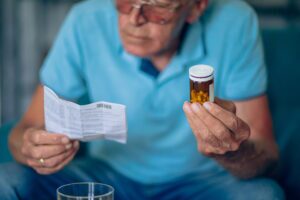Medical Review by Jennie Stanford, MD, FAAFP, DABOM
Summary:
- Take only the dosage of Cialis® prescribed by your healthcare provider for the best results.
- Time your dose carefully—at least 30 minutes before sex if you take Cialis on an as-needed basis, or at the same time every day if you take it daily.
- Cialis® can be taken with or without food, but avoid grapefruit to prevent side effects.
- Healthy lifestyle changes like regular exercise and weight management can support Cialis®’s effectiveness.
- Always consult your healthcare provider before combining Cialis® with other medications or treatments.
Try these techniques to get the best experience while using Cialis®
Many men take Cialis® to treat erectile dysfunction (ED), but medication works differently for everyone. If you’re considering this drug or taking it already, it’s important to understand what you can do to get the best possible results.
We’re here to help. Below, you’ll find information about how you can maximize the effectiveness of Cialis® through lifestyle choices, combination therapies, and getting support from a qualified healthcare practitioner. Read on to set yourself up for Cialis® success.
Proper dosage & timing
Knowing how much Cialis® to take and when to take it are both important for giving the medication the best chance to work properly. Individual needs may vary slightly, but here are some overall guidelines for measuring and timing your dosages.
How much Cialis® should you take for best results?
Cialis® is a branded form of the drug tadalafil, which comes in oral tablets with the following dosage strengths:
- 2.5 mg
- 5 mg
- 10 mg
- 20 mg
If you are prescribed Cialis® to help treat ED, your healthcare provider will tell you exactly how much to take and adjust it as necessary during treatment.
The recommended starting dosage for ED treatment is 10 mg if taking Cialis® on an as-needed basis, or 2.5 mg to 5 mg per day if taking Cialis® Daily. This dose may be adjusted to between 5 mg and 20 mg by your healthcare provider depending on how you respond to the initial dose.
Taking certain medications or having specific medical conditions might mean you need to take a lower dosage of Cialis® or take it less often. Here are some specific situations where your dosage might need to be adjusted:
- Your healthcare provider might prescribe a lower dosage of Cialis® if you are above a certain age, since older populations can be more sensitive to the medication.
- Patients with liver problems might be prescribed less Cialis® than others, or may not be able to get a prescription at all if their condition is severe.
- Some patients with kidney problems (renal impairment) might also be prescribed a lower dosage of Cialis®—with a maximum dosage of 10 mg in severe cases.
To get the best possible experience while using Cialis®, it is vital that you follow your healthcare provider’s instructions closely and only take the dosage that has been prescribed to you. Do not adjust your dosage on your own.
Related: Which Cialis® dose is best for me: 5mg, 10mg, or 20mg?
When is taking Cialis® most effective?
There are two ways to take Cialis®: on an as-needed basis before sex or on a daily basis. Here’s what to know about when to take Cialis® in either case:
When to take Cialis® as needed
Take Cialis® at least 30 minutes before sex if you are taking this medication on an as-needed basis. You could still be able to have sex for up to 36 hours after taking the medication, but it might be less effective afterward.
When to take Cialis® daily
If you are taking Cialis® daily, try to take it at the same time every day for best results. You should not take this medication more than once in a given 24-hour period—but you should be able to have sex at any time between doses.
What to know about food & Cialis®
You can take Cialis® with or without food, but it might be tempting to try combining the medication with foods that are known as aphrodisiacs to increase its effects. Unfortunately, there’s not much evidence to support this practice.
For example, garlic and onions are known aphrodisiac foods—but one study on rats showed that combining them with tadalafil doesn’t seem to make tadalafil more effective.
You might also hear that tadalafil works better if you take it on an empty stomach or if you avoid taking it after a high-fat meal—but research shows that the food you eat doesn’t really impact the drug’s effectiveness in any meaningful way.
There are specific foods and other substances that can interact negatively with Cialis®. See the section of this article called “What to avoid when taking Cialis®” to learn more about them.
Lifestyle changes that support Cialis® usage
Some lifestyle choices have been associated with a lower risk for ED symptoms, which might be helpful if you’re also taking Cialis®. Here’s a brief list:
- Try to get more than 30 minutes of moderate aerobic exercise on most days of the week.
- If you are obese or diabetic, losing 5-10% of your body weight may help.
- Eat more fruits, vegetables, nuts, whole grains, and fish.
- Avoid red meat, processed foods, and refined grains.
Combining Cialis® with other treatments
Combination therapy for ED is still the subject of ongoing research, but early results have shown promise. One study showed that combining daily tadalafil with other PDE5 inhibitors (the most commonly used type of ED medication approved by the FDA) improved results without increasing unwanted side effects.
However, it’s important to note that this research is based on limited data—and that combining medications can be dangerous. Always talk to your healthcare provider about the medications you are using before taking Cialis®, and do not combine any medications before checking with them.
Related: Is It Safe to Use Viagra® & Cialis® At the Same Time?
What to avoid when taking Cialis®
There are a few things you should avoid if you’re taking Cialis®. These can either reduce the effectiveness of the medication or cause unwanted side effects by increasing the amount in your bloodstream.
Grapefruit
Eating grapefruit while taking Cialis® can increase the levels of the medication in your blood. Grapefruit juice reduces the effectiveness of an enzyme that helps metabolize tadalafil, which causes more of it to stay in your system after you take the drug and could increase your risk of side effects.
Excessive alcohol consumption
Drinking too much alcohol while taking Cialis® can cause unwanted effects. It might give you a headache, make you feel dizzy, increase your heart rate, or lower your blood pressure. If you’re taking Cialis®, try to avoid having more than five standard drinks (for example, five glasses of wine or five shots of whiskey) in a single sitting.
Smoking tobacco products
Some research shows that tadalafil can effectively improve ED symptoms in people who smoke—but it’s well-known that smoking contributes to ED, so avoiding this habit is still recommended. Generally speaking, the fewer habits you have that are known risk factors for ED, the easier treatment can be.
Find Cialis® support with Lemonaid Health
Working with a qualified healthcare provider is the best way to make sure you have a positive experience with Cialis®. Your provider can recommend dosage adjustments if needed, suggest lifestyle changes that might support the drug’s effects, and warn you about the potential risks of taking Cialis® with other medications.
Lemonaid Health can connect you with US-based medical professionals who can answer your questions about Cialis® in private virtual consultations. We can also prescribe appropriate medications when clinically indicated for conditions you have, and have them delivered to your doorstep. Get started today to find effective support for ED.
Cialis® is a registered trademark of Lilly ICOS LLC.












